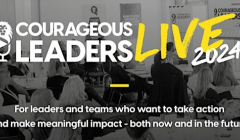
Embracing empowerment and relinquishing control
At Courageous Leaders Live 2024 leaders discuss the importance of time, feedback and making space for others

Technology simply plays the role we give it, so why not use it instead for good, to empower women and help reduce inequality, writes Vee Lockey, Strategist at AnalogFolk.

What do COVID-19 and artificial intelligence have in common? They’ve both independently been heralded as ‘great equalisers’, or forces that don’t discriminate or hold the same biases and blind spots as humans do. This is, of course, untrue.
In many ways, both have been conspirators in entrenching and exacerbating existing gender inequalities in the workplace. But technology simply plays the role we give it, so why not use it instead for good, to empower women and help reduce inequality? A freshly updated digital tool, BigUp.AI, has been launched to do just that.
Within a matter of months, COVID-19 could set women’s workplace equality back decades. McKinsey has calculated that women’s jobs are nearly two times more vulnerable to the COVID crisis than men’s. And while women make up 39% of global employment, they account for 54% of job losses. So why are women more affected? The answer probably won’t come as a surprise.
Women are more exposed to COVID-19’s economic effects because of existing gender inequalities. For example, since women disproportionately take on unpaid care, mothers are 47% more likely than fathers to have permanently lost their job or quit during the crisis, according to a 2020 report from UCL.
We all have a responsibility to ensure the technology we develop to build our new future actually heroes diversity rather than perpetuating the prejudices of the past.
Vee Lockey
Similarly, it is existing, deep-seated gender inequalities that can inadvertently lead to biases in technology. For example, Amazon’s experimental AI recruitment system was taken down after it was discovered that the system had a gender bias against women.
How did that happen? Amazon’s computer models were trained by observing patterns in successful resumes sent to the company within the last 10 years. Most were from men, reflecting the male dominance across the tech industry. As a result, the AI learned to favour language more commonly found on males’ resumes, for example men are over twice as likely to use words and phrases which indicate leadership such as ‘lead’, ‘create’, or ‘deliver’, according to Major Players. The tool also learnt to actively avoid the word ‘women’s’, such as ‘women’s chess champion’.
Despite these potential biases, 67% of hiring managers and recruiters surveyed by LinkedIn in 2018 said AI was saving them time. And in 2020, AI recruitment is predicted to increase. Deloitte’s technical director of privacy, Ivana Bartoletti, believes the pandemic will cause AI-led recruitment to take off at "rocket speed".
This, coupled with the disproportionate impact that COVID has had on female unemployment and unconscious gender biases in recruitment systems, could be disastrous for female representation in the workplace, let alone equality.
Technology itself is neither inherently good nor bad. It plays the role we give it. So, we can choose to use AI to empower women and strengthen their voices, as opposed to rendering them invisible.
And a female-led team at AnalogFolk did just that when they created BigUp.AI, a digital tool that helps women describe their strengths with more assertive language so they can self-promote with impact. The idea was born off the back of the insight that women were four times more likely to shrink their successes, according to Forbes. The tool was launched in beta version for International Women’s Day 2020 and now phase two is here to remind women of their self-worth and strength, right when they need it.
BigUp.AI uses cutting-edge Natural Language Processing and Machine Learning technology to identify strengths and suggest ways to express them in a more impactful, assertive way. Thanks to everyone who helped train the tool at beta stage, the AI can now analyse full sentences of text.
AnalogFolk is continuing to develop the AI so it can read and enhance full paragraphs of text, with the ambition for BigUp.AI to become a go-to tool for women to power up their cover letters, CVs, interviews and performance reviews, making it easier for women to embrace their talents, be confident in owning their achievements and, importantly, to be heard.
As we increasingly rely on advanced technology to help us navigate a post-COVID world, we all have a responsibility to ensure the technology we develop to build our new future actually heroes diversity rather than perpetuating the prejudices of the past.
Vee Lockey is a Strategist at AnalogFolk. She’s passionate about promoting inclusivity and equality within the creative industries and became a mentor for the Creative Mentor Network last year. AnalogFolk is an independent digital agency and strategic partner for progressive global brands. AnalogFolk helps brands realise the full power of digital to create value for people and transform their business.
Looks like you need to create a Creativebrief account to perform this action.
Create account Sign inLooks like you need to create a Creativebrief account to perform this action.
Create account Sign in